#that's it that's the arc of like most of your antagonists
Note
Glad you liked the submission, as I have more on the Aware of Abuse AU!
I think it would be really interesting to reflect on how this situation would be kind of a drawn out grapple for Marinette. This is in no way salt and I think if it was written she'd both warrant having hear grievances hear, but also could definitely come off as a bit antagonistic, or at least wary.
(Exactly how hostile she defaulted to with Chloe tended to oscillate episode to episode so ya know how it be)
Marinette would have the easiest time getting close with Kagami. She has no history like with Chloe & no baggage, IE friendship with Chloe, like Adrien. Tomoe is not someone Marinette admires and its much easier to see abuse in the physicals side. While she'd struggle to see it more in the verbal or negligence side; or otherwise be able to rationalize the negative behaviors such as over protectiveness.
Meanwhile Adrien would be tied a lot closer to Chloe going into school as she'd be being less overtly antagonistic or vain. Plus, they'd have a much stronger "We need each other to keep from falling back into old patterns and to survive" mentality.
Plus Adrien would be a bit more overtly snarky and less respectful to authority or stuff like Gabriel's fashion shows. He still is very nice and super wants to be liked by everyone all the time, but it'd be a lot easier for her to see the negatives in his behavior.
Chloe meanwhile would probably rankle and outright frustrate her the most. Not just because she'd still be hard to get along with in general, or because she still is not against ignoring rules or disrespecting authority figures. But because...
No clue what your religious views may or may not be, but have you heard those talks of "Catholic guilt" and the idea of needing to suffer, do penance, ETC before one can be redeemed?
Marinette wouldn't strictly think or want that, but there would be a part of her that would sort of... Well resent that Chloe is seemingly just choosing to change and not even necessarily enough.
That is to say, Chloe might still rudely reject Sabrina's cookies out of hand but then instantly walk it back and have some.
But more in that she's suffered no defeat, she's not been taken from her previous luxurious circumstances, she hasn't seemingly lost anything and even more she'd not even be overtly contrite.
That is to say, Chloe wouldn't be doing stuff akin to the Lady Luck AU (Nothing against it, great fic!) where she'd frequently reflect on how much of a 'fuck up' she was. Or or say stuff like, "I know I was a bitch but I am trying to be better". Or feel guilt in the "I can't even be mad they assume the worst of me cos I probably would have done X."
She's just choosing to be different and on some level its deeply unsatisfying and even frustrating.
(Where is the arc, the climax, the catharsis!?)
Especially if some people roll with it or let her get away with it when she starts falling into old habits.
Marinette doesn't want Chloe to suffer or beg forgiveness or hate herself she doesn't. She just doesn't understand why now? Why at all? Why because of her friend? Why because of how she was treated and not how she treated others?
Why couldn't she care enough about hurting Marinette to change!?
That I think would be the lynch-pin and one that is, from Marinette's perspective, as well as others in and out of universe entirely sympathetic, she was hurt after all.
But in that same vain Chloe's an abused child lashing out due to trauma and taught such terrible lessons she sometimes couldn't process that she wasn't doing 'right'.
Marinette's been hurt, and that would need to be properly addressed. But it wouldn't need to happen in a self recriminating manner necessarily.
Not that I don't love those, self hating characters rife with issues are fun to explore. It is just that I think it'd be interesting to explore both, changing as a person, and a "Bad" victim getting help before they actually even start processing over much how others might warrant reoperations.
Does that make sense?
The story "restorative Justice" sort of dips into this from a different middle ground angle and most stuff by Generalluxun often have elements of it too.
Oh yeah no it's.
Marinette doesn't understand why Chloé is Like That™ in the first place, so she can't fathom her wanting to change.
From Mari's perspective, Chloé's life is pretty perfect. She's beautiful, she's rich. She can do whatever she wants whenever she wants and always gets her way through money or influence. She's always bragging about how she's so much better than everyone. Clearly her parents must adore her because they spoil her with gifts and never tell her 'no'. Any 'hardships' are just minor inconveniences that Chloé brought upon herself by being mean.
So why would Chloé choose to change? If it's not broke, don't fix it. Chloé's life is Perfect™, why would she do something to make it different?
It's not that she wants Chloé to suffer, or thinks that she /should/ suffer. She just doesn't understand why someone with a Perfect Life™ would change without going through some kind of suffering that forces introspection.
22 notes
·
View notes
Note
The recent post really made me realize just how much I love your version of Clearsky.
Dude was super religious while at the same time basically being in a pissing contest with it.
They gave him the most on the nose lesson on humility possible, and he doubles down on everything in an act of stubbornness that's almost admirable in how awful and stupid it is.
And out of all the BB villains bar Mapleshade, he wins. He is such a fucking menace that he forces his own religion to bribe him and then becomes a patron deity of said religion, and irreversibly changes his entire society for the worse through sheer force of will.
He believes that the world revolves around him and only him, and to be honest, I kinda see why he thinks that
Thistleclaw and Tigerstar wish they were half as successful as Clearsky, and he didn't do it through plotting or magic, but by refusing to learn his god damn lesson no matter how many times it came back to bite him.
I feel like, especially in the Current Day with the Events That Occur around us irl, it's a shame that we never get villains who win through SHEER force of will. It's so, so rare in fiction.
BB!Skystar isn't scheming, he doesn't have a master plan, he doesn't even really have an end goal at the height of his power. He just lives in his own head and does whatever the hell he wants.
That's it! So simple! No self-reflection, absolutely incapable of taking criticism, refuses to grow and change. He has a beautifully simple mind. And it is that very lack of conscious that leads to his strength. You can't shame the shameless. You can't convince him to amend his ways.
There's one way to overcome him; to defeat him, physically. To remove his power. Nothing else will work; he will keep coming back until he is stripped of it. In BB he is the first leader to die, because of that.
Even after Thunderstar refuses to kill a helpless opponent, Skystar took his last chance and went right back to war with it.
And he'll deliver a speech about everyone having one life to give, and about the goodness and righteousness of dying for a cause, but that's all just his rationalization. He can't confront the truth, so he never will. If he did think about it for more than a second... he would be the bad guy.
But he can't. He can't be the bad guy. Because then he would be wrong. So he will simply never think about it.
In the end, what does him in is the fact he got out-bullied by a bigger tyrant. He realized that his power would be threatened by there being less warfare, and he flinched first. His invulnerability was compromised, in that last moment, because it was the ONLY moment where he entertained self-doubt.
I just think he's neat
#HOW could anyone ever give this up for a shitty redemption arc??#Like... he's soo goooddd as a villain#He's EXCELLENT as the most simple. Most straightforward antagonist you ever seen.#What is the definition of evil? Utter self-benefit? In that sense he is evil#True evil. The human kind.#He isn't evil in the sadist sense. But that is very rare to begin with#His type is infinitely more common. And more interesting#Because it's not deep at all. It's very simple. If you try to DIVE DEEP to understand it you'll miss it completely#It feels good to get what you want.#It feels bad to acknowledge your own wrongdoing.#Two steps.#Better bones au#Bone babble#BB!Skystar
97 notes
·
View notes
Note
Out of curiosity, any thoughts on the anime Bleach?
I consumed a fairly good chunk of it when I was younger. It's since faded in my passions. I think Rolling Star by Yui is by far my favorite of the openings but a lot of them are very good.
I think the visuals are fairly stylish but it suffers the shonen problem- granted, I think a lot of this is in the format of how long running shonens are produced- of starting out with a bold exciting concept and then sort of petering out in weird directions the longer it goes on. In Bleach's case, I really loved the design and concept of the early hollows, but from the Soul Society arc onward, this entire fascinating afterlife concept boils down to Fashion Sword Boys Fightin' It Out.
Most of my residual fondness for it has me eyeing @gallusrostromegalus's An Elephant Is Warm And Mushy, because it seems to be taking a lot of the later series and injecting that sense of weird monsters and afterlife ramifications back into it.
#Bleach#I actually really liked the intro episode of Don Kanonji#the idea of a 'hoax' TV medium actually having just enough of a foothold in this world to do damage#and then having to realize that and acknowledge his own relationship with it#I think this is why many of the later arcs disappointed; I was most interested in seeing how this world impacted and related to the mundane#similar powerful early episodes to me were the 'haunted cockatiel' and the episode with Orihime's brother#later arcs absolutely have their perks#I actually unironically like the 'king and his horse' speech#even though I think it plays to some limitations of the genre that everything has to be settled by hierarchical power levels and fighting#like I dunno maybe your ~EVIL SIDE~ isn't actually evil as much as someone who has not decided if they want to obey you or not#because why would they#do they respect you enough to actually want to help you with your goals#wouldn't anyone 'act up' in that situation trying to have their own priorities#ALSO ALSO it aggravates me that the closer to main character you get#the more boring your weapon powers get#some of the secondary characters and temporary antagonists and such#have REALLY COOL powers#but Ichigo is like ok. here's my power. it's basically a laser gun#pew pew#sorry Ichigo. you are trying to be main character while that one guy is over there with the executioner's weapon that weighs opponents down#Hanataro's the objectively best character though hands down y'all can fight me#(nobody actually fight me I have zero horses in this race)
11 notes
·
View notes
Text

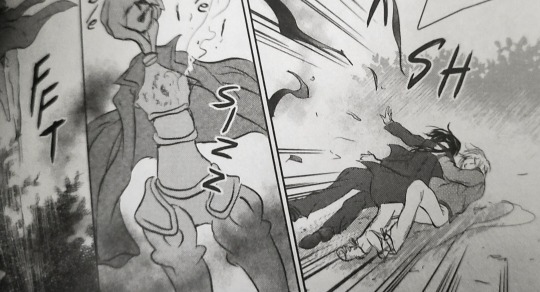
blurry 2 a.m. manga pics from my weekly sob sesh last night but i find it soooo fascinating and so fun and so hilarious how much of a loser fallible we get to witness him being in the recent arcs! from the insufferable self-assuredness and the skill to back it up in the early days ('dont miss' / 'who do you think i am? :)' <- ie. within the top ten iconic matoba seiji moments to me personallyyy) to.....being blinded by the hunger for power to his own detriment and to the point of needing to be rescued by the kindest teenager in the world whom he once harassed relentlessly and his weird pseudo-ex who is notoriously weaker than him. oh HOW THE TURN TABLES!!!
#ms. midorikawa has never made a poor creative choice in her life#like the double-whammy of miharu and homura arcs in such close proximity knock me tf out for various reasons but to go#oh he's sad lonely lovesick AND actually kinda dumb sometimes!!!!! re: your most ~fearsome antagonist to date#is such a power move i'm obsessed#on an aesthetic level i am so glad for every shot of his lil kitty eye and its delightful to see how the art has developed over the years#this being the arc where natsume (audience stand-in) goes huh he is like a little kid sometimes (and natori goes ☺️ about it) is also A Lot#and supplements the “OKAY SO I'M THE DRAGON--no shh you are a little failbaby sometimes and its ok” agenda so beautifully!!!#natsume problems#horrible exorcist number one
8 notes
·
View notes
Note
I found your blog from 1 of your look books and ended up reading every ask for your story tag ... I was so impressed by each character but I got to know more about Maggie! Pls don't take it the wrong way when I say I some how hate her & also am obsessed with her (I know people get mad when you dislike a character but I think it's a compliment bc it means the writer made them complex)
First and foremost: thank you, friend!! That means a lot to me that you took the time to binge through my content and that you ended up enjoying it so much that you would stop by to tell me!!!
Second, I truly don't take it the wrong way lol. I get it, not every character is going to be liked or perceived well. You have a right to feel about them however you feel.**
**Little footnote here: I think it goes without saying but so long as your reason for disliking them isn't rooted in some kind of irrational hate like racism, transphobia/homophobia, etc., you're fine in my book!
Honestly I'm just interested in knowing what it is you dislike about her! It's a little funny because this isn't actually the first message I've received of this nature and I feel like I've shared so little about her. I know as time goes on and people learn more about her that she is more than likely going to be a controversial and polarizing figure (and far from the only one in this story). I personally have a lot of love and empathy for her as the writer and do see her more as a victim to things out of her control, but I can also admit that she went out of her way to make it hard for others to love her at times.
I will totally take it as a compliment, as you intended! I'm happy to create characters that challenge people; my only hope is that despite personal preferences, readers will still be able to understand that at the end of the day we all are imperfect and nuanced creates. Even if you don't like her, I hope you will see her (and the other controversial characters) in more than one light and extend grace (or at the very least, understanding) when it's all said and done!
#Gosh I could go on forever about this topic. I know simblr isn't always the medium for these 'darker' stories or character arcs -#I get reminded of that constantly when I get an ask about making Erwin 'depressed' or 'changing his goofy character too much' (even though#he literally has traits that indicate he's not just some uwu goofy happy idiot but I digress) -#but these characters mean so much to me. Erwin & Maggie are truly so personal to me. They make me the most emotional to write for...reasons#I hope even characters like Ted - who I write with the intention of being an antagonist - will be viewed in a nuanced light. I want people#to feel complicated feelings for them. Humans are big fucking ethical dilemmas lmao and I want to show that#Thank you so much for your ask!! <3#strangerville outtakes#Maggie Pries#atfs ask#anon
2 notes
·
View notes
Text
I adore the fact that in so many other stories, Mob Psycho would’ve concluded with the World Domination Arc. After all, it has the big, climatic battle with the ensemble cast versus the overarching villain. They win, and everyone goes home, all’s well that ends well, right?
Except the story doesn’t end there. Because Mob has yet to reckon with this internal, antagonist force that has haunted the narrative since the very beginning: Himself.
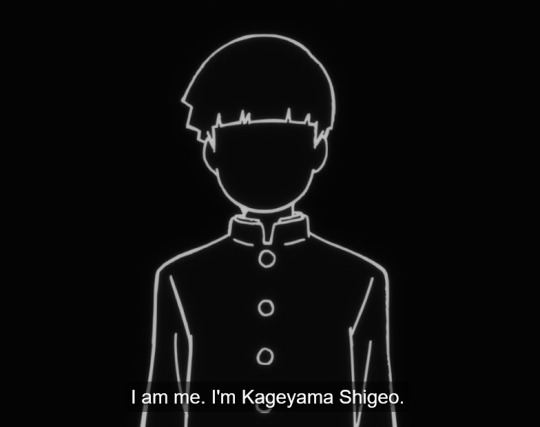
When Mob comes face-to-face with ???% at long last, he says: I am Kageyama Shigeo.
This isn’t a conflict with a villain, or another esper, or even a separate entity that resides inside Mob’s body. It is something far more personal, and far more relatable.
???% is the culmination of everything Mob’s held back. Not just emotions like anger or fear. Even his desires, like his crush on Tsubomi. All muted by his efforts not to hurt anybody with his powers. Mob has come such a long way, but he’s still restraining his feelings so tightly that the moment his control wavered, ???% took over.
But the conflict isn’t the destruction ???% is wreaking just by walking through the city. The conflict is Mob refusing to accept this part of himself he’s suppressed for so long.
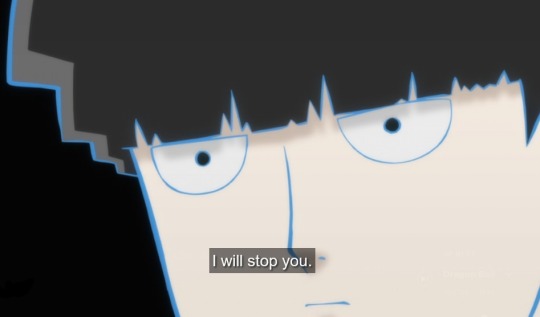
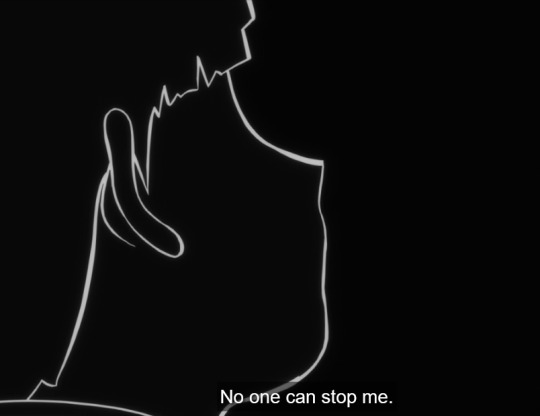
And ???% is right! Every attempt to stop him thus far has failed. Because he isn’t meant to be stopped. Mob has to reconcile with the parts of himself that he won’t acknowledge.
And it’s the most difficult thing Mob has ever had to do! This is the part of himself that hurt his brother; that hurt his friends and decimated so much of the city. Reconciling with it means accepting that Mob hurt those people, whether he wanted to or not. It means accepting all facets of himself, even ones he’s not proud of or wishes he could change but cannot.
Mob has grown so much in this latest season alone, he hasn’t had any explosions, and he felt confident enough in his own abilities to actually ask Tsubomi out, which was something the Mob of two seasons ago could never imagine.
But what about the advice Reigen gave him for his confession to Tsubomi?
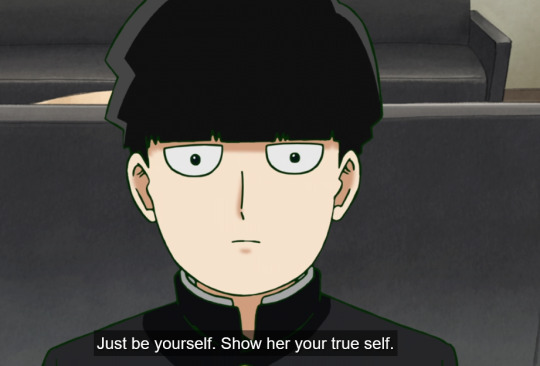
His true self, in its totality. This is what Mob has struggled with the entire story. This is why his confession to Tsubomi is the culmination of his character arc. Expressing his feelings means exposing his true self to someone else, even with the fear of rejection.
And while we’re on that subject. Let’s talk about Reigen. Right after he gives this advice to Mob, he says this about himself:
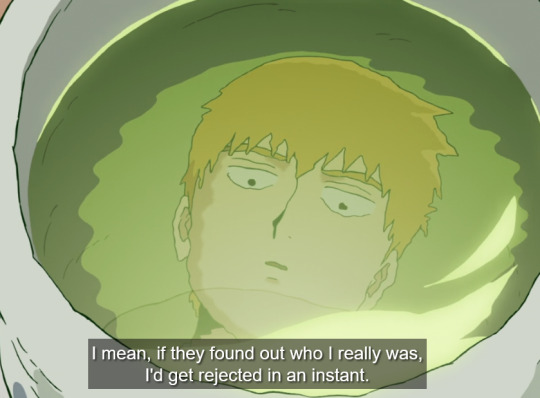
It is the height of irony (and tragedy) that Mob and Reigen admire each other’s strengths so much, yet have no idea they struggle with the same exact fear: that if the people they cared for found out who they truly were, they would reject them. It is why Reigen relies on lies and why Mob suppresses himself.
It is also why Reigen has never actually witnessed ???% until now. It is why Mob has never heard Reigen admit the truth about himself out loud.
And that’s why the final arc feels like such a gut-punch in the best of ways. What is harder than accepting who you are, and hoping for others to accept you as you are? Even at your most deceitful, or your most destructive? Mob Psycho ends with the Confession Arc because that’s the very heart of the story.
#mp100#mob psycho 100#mp100 spoilers#mp100 s3 spoilers#kageyama shigeo#reigen arakata#tearing up as I typed this don’t mind me#I’m a manga reader too but seeing this animated finally got to ne#and then the reigen parallels hit me!!!#I’m not Ready for next episode
9K notes
·
View notes
Text
How to Start a Story Idea
Tackling a whole 50,000+ word novel can be a lot. Here are some ways to break down the process to make it a little more digestible.
Choose, research, and enjoy your story's setting. Whether this is a fantasy realm, a lost planet, or a small suburban town, know and research where your story takes place. Think about the time period, cultural details, geography, the laws/rules, etc. This is a world where the reader will be spending hours, so make sure it's immersive.
Place your protagonist in the world and give them a story. You could have the most detailed fantasy world, but that means nothing without a story or character to explore it. Create a compelling main character and give them a story that progresses them throughout the world you created.
Find your story's theme. A well-rounded story will revolve around a theme or central idea. Some themes include survival, love, good vs. evil, death, war, forgiveness, etc. What do you want to teach your readers or leave them with once the novel is finished? Do you want them to know that forgiveness is important? That war creates wounds only love can heal? That beauty is in the eye of the beholder? Weave these themes and lessons into your plot and story.
Create a cast. Build your protagonist friends and foes that support or challenge them on their journey. Give some of these characters their own arcs/side plots to thicken your story. There are a bunch of character types that you could add to your story such as the love interest, a mentor, an antagonist, minor characters, etc.
Divide your novel into acts. Once you know the big picture of the story you want to tell, break it up into acts. There are three main acts of a traditional story: Acts I, II, and III. Look up and consider following the Three-Act Structure to give your story a fluid motion of beginning, middle, and end.
Know your ending. The ending is the final part that your readers digest, meaning that it will likely stick with them. You don't have to fully understand how your novel will end, but having somewhat of a plan is important. This way... when you write, you're writing towards something.
Instagram: coffeebeanwriting
#writing tips and tricks#writing tips#writing advice#creative writing#writeblr#writing blog#how to write#writing help#writing fiction#writing prompts#fantasy writing#authortips#authoradvice#writingtips#writingmemes#writers blog#writingblog#authorsblog#howtowrite#writingtipsandtricks#writerscommunity#writers community#writinghelp#writingprompts#writertips#howtowriteascene#writingfiction#fictionwriting#fantasywriting#writing memes
2K notes
·
View notes
Text
The 5 Most Essential Turning Points in a Character’s Arc
You spend so much time creating a character because you want them to feel real. You want to connect with them and use them to create an experience for your readers. Their character arc is how that happens.
Don’t miss out on these essential turning points that make an arc feel not only whole, but complete.
1. The Inciting Incident
Your inciting incident gets your plot moving. It isn’t going to be the first sentence of your story (also called your hook), although it could be if you crafted your first sentence for that purpose.
An inciting incident is a plot event that guides your character in a new direction. It’s the successful prison break, the meeting of instant rivals, or the moment your protagonist wins the lottery in your first chapter.
Without the inciting incident, your protagonist’s life would carry on as usual. They wouldn’t start the arc that makes them an interesting person for the reader to stick with throughout your story.
2. Introducing the Protagonist’s Main Flaw
Every protagonist needs a primary flaw. Ideally, they’ll have more than one. People aren’t perfect and they rarely get close enough to only have one negative characteristic. Protagonists need that same level of humanity for readers to connect with them.
There are many potential flaws you could consider, but the primarily flaw must be the foundation for your character’s arc. It might even be the catalyst for the story’s peak.
Imagine a hero archetype. They’re great and well-intended, but they have a problem with boasting. Their arc features scenes where they learn to overcome their need to brag about themselves, but they get drunk and boast in a bar right before the story’s peak. The antagonist’s best friend hears this because they’re at the same bar, so they report the hero’s comment to the main villain. It thwarts the hero’s efforts and makes the climax more dramatic.
Other potential flaws to consider:
Arrogance
Pride
Fear
Anxiety
Carelessness
Dishonesty
Immaturity
3. Their First Failure
Everyone will fail at a goal eventually. Your protagonist should too. Their first failure could be big or small, but it helps define them. They either choose to continue pursuing that goal, they change their goal, or their worldview shatters.
Readers like watching a protagonist reshape their identity when they lose sight of what they wnat. They also like watching characters double down and pursue something harder. Failure is a necessary catalyst for making this happen during a character’s arc.
4. Their Rock Bottom
Most stories have a protagonist that hits their rock bottom. It could be when their antagonist defeats them or lose what matters most. There are numerous ways to write a rock-bottom moment. Yours will depend on what your character wants and what your story’s theme is.
If you forget to include a rock-bottom moment, the reader might feel like the protagonist never faced any real stakes. They had nothing to lose so their arc feels less realistic.
Rock bottoms don’t always mean earth-shattering consequences either. It might be the moment when your protagonist feels hopeless while taking an exam or recognizes that they just don’t know what to do. Either way, they’ll come to grips with losing something (hope, direction, or otherwise) and the reader will connect with that.
5. What the Protagonist Accepts
Protagonists have to accept the end of their arc. They return home from their hero’s journey to live in a life they accept as better than before. They find peace with their new fate due to their new community they found or skills they aquired.
Your protagonist may also accept a call to action. They return home from their journey only to find out that their antagonist inspired a new villain and the protagonist has to find the strength to overcome a new adversary. This typically leads into a second installment or sequel.
Accepting the end of their arc helps close the story for the reader. A protagonist who decides their arc wasn’t worth it makes the reader disgruntled with the story overall. There has to be a resolution, which means accepting whatever the protagonist’s life ended up as—or the next goal/challenge they’ll chase.
-----
Hopefully these points make character arcs feel more manageable for you. Defining each point might feel like naming your instincts, but it makes character creation and plotting easier.
Want more creative writing tips and tricks? I have plenty of other fun stuff on my website, including posts like Traits Every Protagonist Needs and Tips for Writing Subplots.
#character arcs#creating characters#creating character arcs#character development#writing characters#character concept#plotting#how to plot#writing plot#creative writing#writeblr#writers of tumblr#writing tips#writing advice#writing resources#writing inspiration#writing community#writing help#writing
1K notes
·
View notes
Text
Japanese Linguistic Observations in Spy x Family - part 3
Part 3 - Yor's keigo
I discussed in part 1 about the different levels of speech in Japanese, particularly how Twilight changes his speech depending on the persona he's donning. He uses keigo, the standard polite form of speech, when he's acting as Loid Forger, but uses casual speech as Twilight. Yor, however, uses keigo all the time, to a degree that some would feel is excessive, but also makes sense for her character.

Keigo is the most basic form of polite speech in Japanese. It's the speech that's taught in pretty much every beginner Japanese learning course because it's the "safest" for most situations. Without getting too technical, it basically involves using the polite conjugations of verbs. All verbs in Japanese have a "polite" conjugation form that's used in keigo. For example, the verb "to go," 行く (iku), will change to 行きます (ikimasu): change the く(ku) to き (ki) and add -ます (-masu). -masu itself is then conjugated further to show past tense, negative tense, etc. Likewise, one would use です (desu) as the "to be" verb instead of its casual equivalent だ (da). For example, saying 車です (kuruma desu), which means "there is a car" instead of 車だ (kuruma da). It's even more casual to leave out the "to be" verb altogether.
Unlike Twilight, who changes his speech depending on who he's talking to or which facade he's using, Yor consistently uses keigo, whether she's talking to an adult like Loid, a child like Anya, and even an animal like Bond. She uses keigo with strangers as well, even those who are antagonistic to her, like the other assassins in the cruise arc.
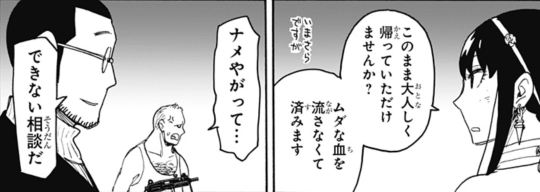
Even at times when using polite speech isn't warranted, like in her own thoughts, she still uses keigo regardless.
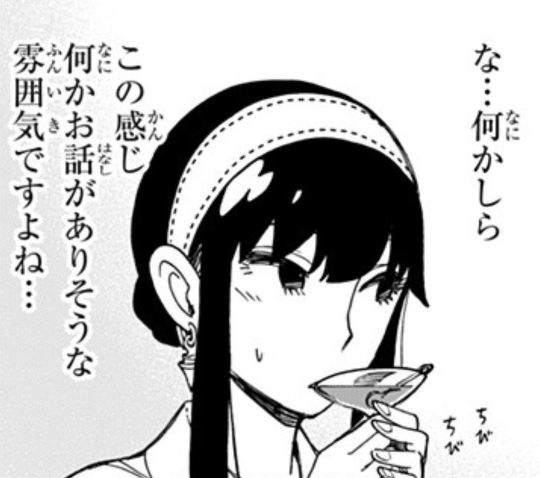
In addition to using keigo with pretty much everyone, she also uses the polite -さん (-san) honorific with everyone's names as well. It's not unusual to do this with fellow adults like Loid, Camilla, and Franky, but when it comes to kids, especially when they're not your own kids, other honorifics are also an option. For example, adults can use the honorifics -ちゃん (-chan) for little girls and -くん (-kun) for little boys, both of which denote endearment to someone young/cute. Loid calls Damian "Damian-kun" and Fiona calls Anya "Anya-chan" for example. But Yor uses "-san" for Anya, Damian, Becky, and probably every other kid she hasn't met yet! She uses "-san" with animals as well, which isn't nearly as common. She's the only one who calls Bond "Bond-san" and she even called the cat Kopi from chapter 43, "Kopi-san."
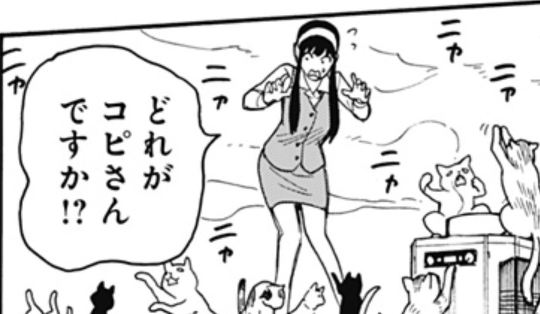
She also uses "-san" for people whose names she doesn't know, and in some cases, probably shouldn't show respect to. She calls the terrorists from the doggy crisis arc "terrorist-san", bad guys that she takes out on her missions "warumono-san," Olka's group "mafia-san," and the other assassins from the cruise arc "koroshiya-san."
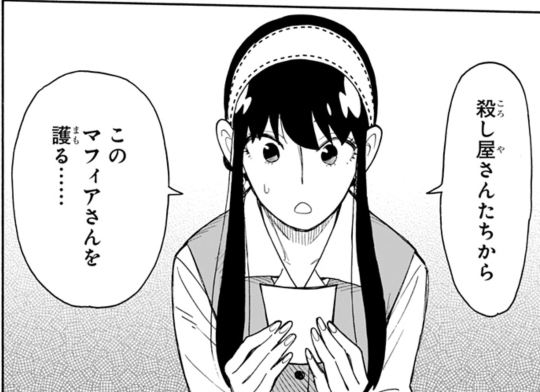
The only exception to Yor's excessive use of keigo is Yuri, which makes sense since it's standard practice to be more casual with a younger relative than an older relative or someone outside the family. He's the only person she refers to without "-san" (she just calls him "Yuri"). And while she does use the informal verb forms with him, she still uses "desu" and its conjugations. So overall, she's more casual with him, but not completely so.
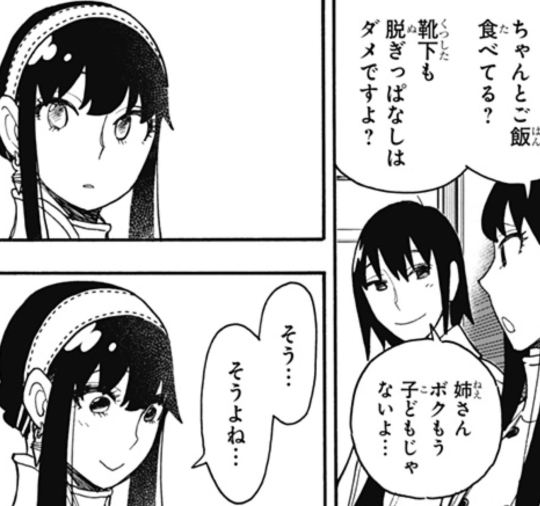
When talking about herself, Yor uses the standard, gender-neutral, polite word for "I"/"me," 私 (watashi). However, when talking to others, she never uses any form of "you." Like I mentioned in part 1 about how there's different ways of saying "I" and "me" in Japanese depending on the speech level, the same is true for "you." But it's always more polite to say someone's name or title instead of "you," and Yor does that all the time. Just like in part 2 how I couldn't recall any instance where Anya says "I" or "me" since she always refers to herself in third person, I can't recall any time Yor called someone "you" instead of saying their name or title.
While Loid uses the casual "you" word お前 (omae) when talking to Anya, Bond, Franky, and anyone else he doesn't have to be polite with, he doesn't use any form of "you" for Yor. He speaks to her the same way she does to him – saying her name plus "-san" instead of using "you."
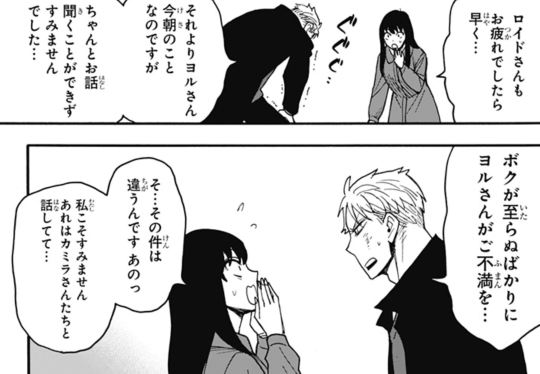
Unlike English, Japanese is a language where you don't have to say pronouns if it's understood by the context, which is why something like this is difficult to convey in a translation.
I think it's an interesting contrast that Twilight is constantly changing how he speaks depending on whether he's acting as Loid Forger, as a spy, whether he's conversing with a fellow spy like Fiona, a casual friend like Franky, someone he respects but can't be fully open with like Yor, and even how he talks to himself in his head…yet Yor is the total opposite. As I've discussed in this post, she's extremely consistent in her speech, never straying from being polite no matter who she's speaking to or whether she's in her Thorn Princess role or not, or even whether she's speaking to herself in her head or not. This just further proves that, while Yor has to keep her assassin job a secret, she doesn't have to create a fake persona for it. Unlike Twilight, who acts one way as a spy and another way as Loid Forger, and perhaps another as his "true" self, Yor doesn't feel the need to hide anything about herself other than her job as an assassin – Thorn Princess and Yor Forger are the same person who shows respect for others no matter what her relationship is with them.
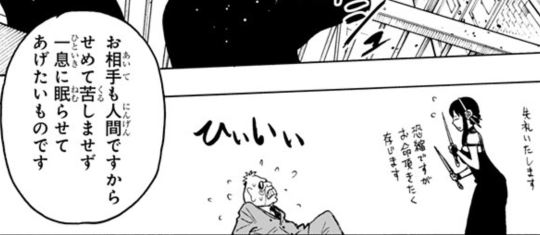
Such excessive use of keigo is odd for a fluent speaker, but it's not unheard of. There are plenty of examples of characters from other anime/manga who use keigo all the time too. I think it gives us an interesting, subtle look into their character. In Yor's case, I think her constant use of keigo comes from a combination of her sweet personality that never wants to offend anyone, but also her poor self-esteem. After all, keigo and other polite forms of Japanese speech are meant to elevate the listener while humbling the speaker. Yor speaks politely to everyone because she simply wants to be kind to everyone and make them feel comfortable, even those she has to kill, but at the same time, she often feels inferior to others.

However, there are rare exceptions where Yor stops using keigo which are, appropriately, during very suspenseful, high-stakes moments where politeness would be the least of her worries. For example, during her fight with Barnaby when she realizes she's holding back, she starts using casual speech. But she goes back to keigo before too long.
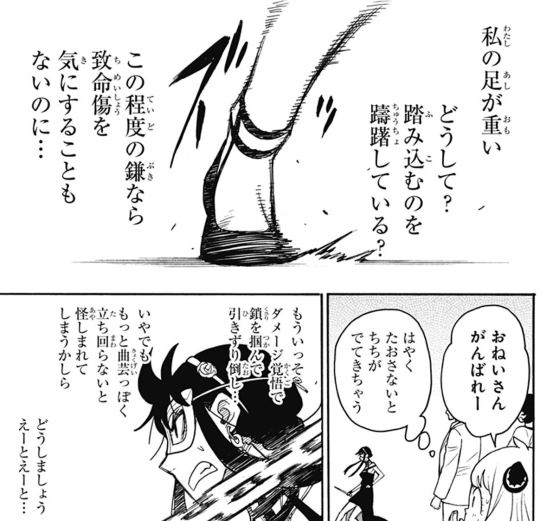
But probably the most notable example of her completely dropping keigo is near the end of her big battle against the assassins on the cruise ship, where she finally comes to realize what she's fighting for. During her whole epiphany scene – starting from when she thinks of Yuri and herself as kids until she stands up and says she won't stop fighting – she switches completely to casual speech.
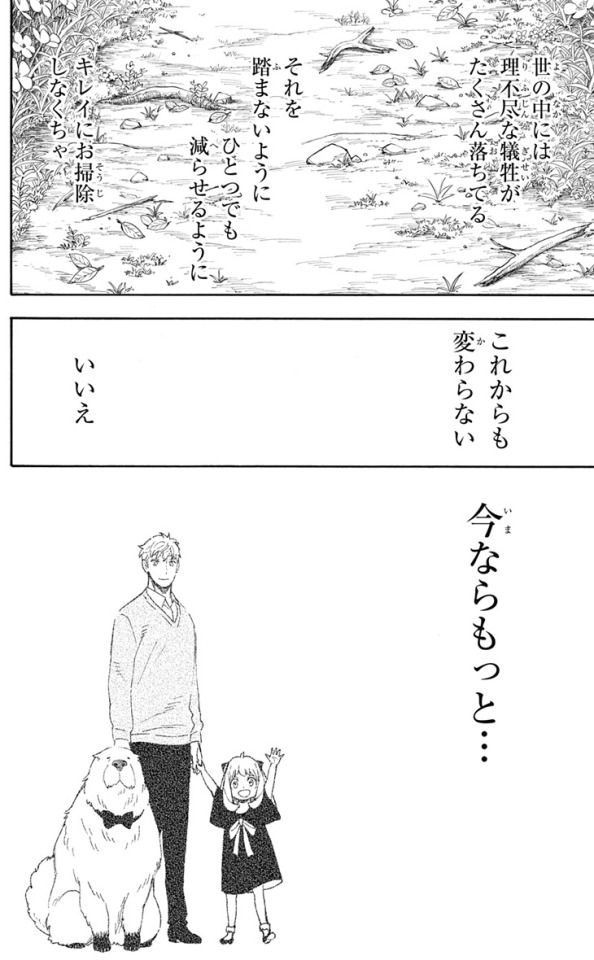
There are many ways to interpret this, but I think it shows what an emotional revelation this was for her: she remembered that the suffering in the world is what caused her to want to protect Yuri from any kind of tragedy, and now the same can be said for Loid, Anya, and Bond. She remembered the words of acceptance she heard from Loid when they first met, words no one else had likely ever said to her before. She realized that she didn't care what happened to her as long as she could stop anything bad from happening to her loved ones – in that moment, no formalities were necessary with such intense self-reflection.
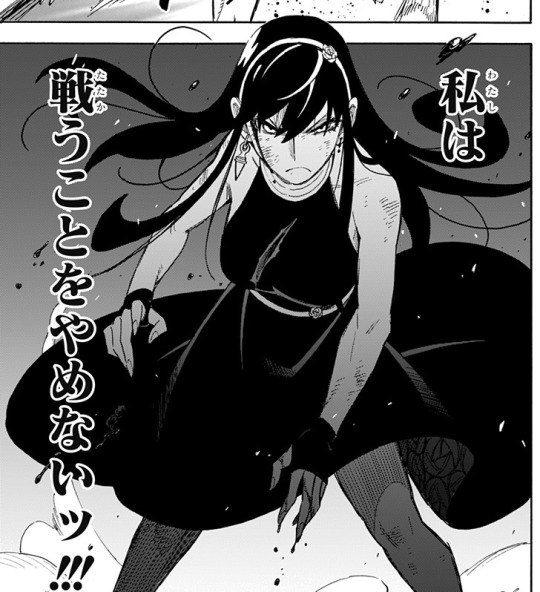
<- Return to Part 2
#sxf#spy x family#spy family#spyxfamily#loid forger#yor forger#anya forger#twiyor#sxf manga#sxf analysis#sxf manga spoilers#sxf meta
347 notes
·
View notes
Note
Hello! Kind of a weird meta question that may be too early to call, but what are your thoughts on Vegapunk? For some reason, I can’t seem to get a good grasp on how to feel about them. Normally, I am all aboard with each arcs’ respective “ally” character - but I just can’t seem to fully get behind Vegapunk.
the important thing to understand here, i think, is that vegapunk is not meant to be an unambiguously good character. he’s not! he’s a brilliant and complicated man with many flaws whose inventions, while well-meaning, have done immense harm to the world! and i think it would be a mistake to assume that the story expects you to view him as entirely good just because he is, at present, an ally of the strawhats.
egghead arc is, in large part, about the collateral damage of vegapunk’s brilliance. this is demonstrated to us both on the worldwide scale (his creation of war machines) and on the interpersonal scale (what happened to kuma). i don’t think it’s a coincidence that we’re shown the catastrophic destruction of lulusia by one of vegapunk’s creations right at the beginning of the arc.
vegapunk is the smartest man in the world, but correspondingly we’ve been shown he’s also selfish, overconfident, and doesn’t consider consequences. until things reach a head in egghead arc, he’s unwilling to go against the government in any but the most plausibly-deniable of ways, even as his creations are used to commit atrocious acts of violence.
and it’s not as though he was forced into government service with no other options available- he’s obviously subject to coercion by the elder stars, but he also declines dragon’s offer to join the revolutionary army explicitly because the government pays better, even while standing in the ruins of ohara. like, it is noteworthy that vegapunk’s personified greed is an antagonistic force in this arc.
vegapunk is a character trying to make amends by the time of egghead arc- by helping bonney, by investigating the void century- and like i said, it’s clear that his intentions have always been to help the world; but that doesn’t absolve him of responsibility for all the damage he’s done, either.
additionally, i would say that the designated ‘ally’ character for this arc, if there is one, is bonney, not vegapunk. her role as the emotional core of this arc is quite similar to law’s in dressrosa. vegapunk’s narrative role is, i think, somewhat more complicated than that.
262 notes
·
View notes
Text
To Ragh; or, On Fatness
Hi! Below is an actual play mini-essay. These are written as part of a personal writing practice of thinking critically about actual play. I hope you find this reading engaging and know that all I write reflects my own interpretations rather than as an official representation/canonization of these shows. Keep reading for my interpretation of Ragh Barkrock's fatness as part of queer representation in Dimension20.
Ragh Barkrock may be one of the most beloved NPCs in Dimension20. It would be easy for Ragh, a bloodrush player good enough to potentially play professionally, to be presented as hypermasculine. In fact, the freshmen year art for Ragh, when he was antagonist rather than beloved ally, showed him in a muscular, inverted Dorito shaped body typical of a jock.
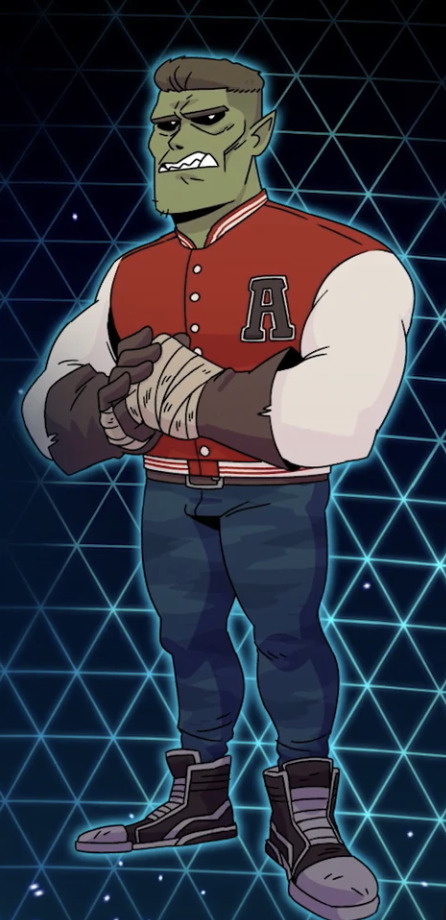
He's, obviously, built, and his cut jaw and cheekbones only bolster that image. As Ragh comes to terms with being gay at the end of Fantasy High, his countenance changes. When we see him again, the new art reflects a chubbier, happier Ragh.
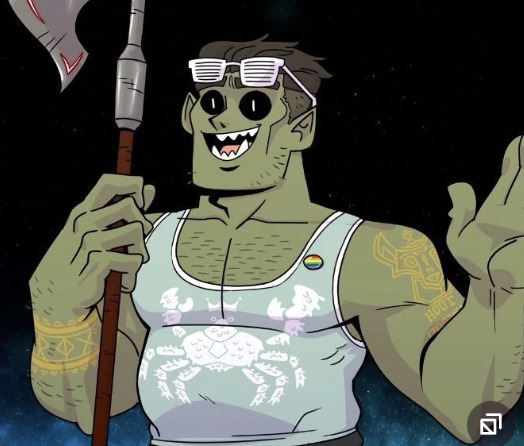
The show aligning weight gain with acceptance and happiness already works against prevailing stereotypes that use weight loss as a quick metaphor for improving yourself and being the "real you." Moreover, connecting Ragh's acceptance of his sexuality with what seems like a larger comfort in his own body is a strong indictment of hypermasculine gay culture. As Gabriel Arana writes, gay men "must reconcile their sense of masculinity with their failure to conform to its heterosexuality." Not doing so has negative mental health outcomes, as Arana points out, and contributes to a culture that devalues fat queer people (see the popular "no fats, no femmes, no Asians" that often is touted in masculine gay subculture).
All of this, I think, is why Ragh's art for Junior Year was particularly impactful for me as a fat queer person. If being a gay man (or half-Orc, in Ragh's case) means having to situate your life in relationship to failing compulsory masculinity, then it seems there is an inherent queer aspect to embracing, celebrating, and showcasing a beloved NPC in an explicitly fat and happy body.

FHJY Ragh art by @caitmayart
Ragh is still strong and he is still fat. His body radiates a commitment to the power of fat bodies to exist in spaces they are often violently unwelcome in, such as gyms. Existing in gyms and sports spaces as fat people means dealing the "impossible standard that rejects nearly all of us" and upholds a diet culture rooted in impossible, Eurocentric and colonial body standards. In TTRPGS or actual plays, there is a unique opportunity to think about how bodies might exist in worlds different from ours, to imagine bodyminds as otherwise. However, as queer critics like Paul Preciado have noted, sci-fi and fantasy representations of cyborgs and other transformative bodies often lean into "fixing" disabled people or moving gender nonconforming bodies more easily towards technologies upholding a normative standard rather than questioning the standard all together.
Spyre is a world that deals with similar issues to ours, even without direct one-to-one correlations, so it, too, is a place where the narrative and artistic choices should be examined in how it helps us interpolate the world the audience resides in. From the Applebees cultish adherence to a deity-based nationalism to the various representations of parental neglect and abuse and every side story in-between, Dimension20's flagship show does not shy away from difficult realities even when recasting them through fantasy. Ragh, as a half-orc gay son of a disabled single mother, then, I see the arc his fat body goes through as meaningful and intertwined with his self-acceptance and queerness. He moves away from the toxic masculinity engineered into his blood rush team to instead pursue coalition comraderie with his friends to the point that he and his mother end up joining a communal living situation with those friends and their parents. Ragh's body expands as his family does, as his ties to community do, and to me, the gift of his fatness is the invitation to expansion that it holds out to us as viewers.
#dimension 20#actual play#fantasy high: junior year#fhjy#fhjy spoilers#ragh barkrock#lydia barkrock#brennan lee mulligan#emily axford#lou wilson#zac oyama#siobhan thompson#ally beardsley#brian murphy#riz gukgak#kristen applebees#fabian seacaster#adaine abernant#gorgug thistlespring#figeroth faeth
237 notes
·
View notes
Text
The Most Powerful Hack to Make Your Readers Cry
You’ve seen it all: show, don’t tell, plant a visceral image in the reader’s brain of the environment/character, write a complex character arc with lots of growth and setbacks, establish deep relationships, high stakes, etc.
All the advice for making readers cry I’ve seen so far is basically that list. But, while those things are absolutely important, I find that the thing that always does the trick, whether as a tipping point or in and of itself, is this:
THE CALLBACK!
Before we move on, this is an ANALYSIS heavy post, so all the book + show examples contain spoilers!!
So, what do I mean by a “callback?” Think of Chekhov’s gun, but, here, you use the gun to pierce your reader’s heart. As a refresher for anyone who needs it, Chekhov’s gun is just a rule in writing that anything you introduce in the book should play some role in the plot.
Specifically, the name comes from the example that if a reader introduces a gun in the first act, it MUST go off later, (maybe, say, in the third act). For example, in the TV show Breaking Bad, the protagonist Walter White prepares a vial of poison (ricin) that he wanted to use to eliminate an opponent early on in the series. After the assassination attempt falls through, the ricin makes an appearance again in the very last episode of the show, when Walt finally uses it to kill another opponent.
Got that? Alright, onto the examples of successful, tearjerking callbacks:
1. The Last Olympian (Rick Riordan); “Family, Luke, you promised.”
Context: The character Annabeth says this line. Years ago, Annabeth had run away from home, and Luke had effectively adopted her into a found family with another kid named Thalia. Common reason for leaving home = parental trauma! Yay! He promised Annabeth that they would be each other’s “family” from now on.
Now: Kronos, the antagonist titan, has possessed the demigod Luke and uses his body to strike Annabeth, injuring her. She’s also holding a dagger that Luke had given her when she joined his “family.”
Significance: her words + the dagger are a mental + physical reminder to Luke of his promise. They force him to recognize the sheer degree of his current betrayal by bringing him back to a different time. The fact that their found family only happened because of parental trauma bringing them together makes it worse—Luke felt abandoned by his Olympian father, Hermes. Now, he realizes that he basically did the equivalent to Annabeth by joining the titans.
2. Les Miserables (Victor Hugo); Jean Valjean’s death
Context: At the beginning of the book, the bishop had caught Valjean trying to steal candlesticks to sell. Instead of handing him over to the police, the bishop told the police that he had given them to Valjean, saving him from arrest and showing him mercy. This changed his life forever, kickstarting his character redemption arc.
Now: Jean Valjean dies surrounded by his loved ones, remembered as a benevolent man who bettered thousands of lives. He’s surrounded by light from candlesticks that once belonged to a bishop.
Context: Valjean had once taken in an impoverished woman named Fantine, showing her mercy and promising to take care of her daughter, Cosette, after Fantine died. Valjean then rescued Cosette from abusive quasi-foster parents (it’s a long story), raising her as his own daughter. This furthered his arc by allowing him to finally understand how unconditionally loving someone feels.
Now: Valjean describes Fantine to Cosette, who never knew her mother.
Significance: Both examples throw readers back to much earlier points in the story before the completion of Valjean’s character arc. In a way, this final scene feels like an external manifestation of his kindness paying off; both he and the reader feels a sense of accomplishment, relief, and just a general “OMG WE MADE IT.” Readers don’t feel cheated, because they were with Valjean every step of his 1,400 page arc. The weight of it all just crashes down on you...
3. Your Lie in April (anime); Kaori’s letter after she dies
Context: Kaori’s entire plot significance is that she helps Kousei, a piano prodigy who can’t play piano anymore due to traumatic parental memories associated with it, play again—but also, just to help him enjoy life again after a turbulent upbringing. She meets him a year before she dies of a medical condition, and her free spirit + confidence influences him to find beauty in life and music again. They basically do a crap ton of crazy funny stuff together lol
Now: Kaori has died, and she leaves a letter to him. Among other general confessions and thoughts, she references things they did and memories they shared: she says, “sorry we couldn’t eat all those canelés,” reminisces about jumping with him off a small bridge into the stream below, “racing each other alongside the train,” singing Twinkle Twinkle Little Star as they rode the bike together, etc.
Significance: Yes, the nature of the letter is just sad because she’s revealing that she loved him all along, apologizing for not being able to spend more time with him, lying that she didn’t like him (to spare his feelings b/c she knew she would die soon), etc. BUT, these small details highlight exactly how many experiences they shared, and the depth of their relationship. Thus, they emphasize the significance of her death and the emptiness it leaves behind.
4. Arcane (show); “I thought, maybe you could love me like you used to, even though I’m different.”
Context: Character Jinx says this in the last episode to her now estranged older sister, Vi. Without going into the crazy complex plot, basically, orphans Vi and Jinx used to care for each other before a bunch of crap went down that got them separated. They then grew up on opposite political sides; Jinx grows up on the side of the underbelly city rebellion, and Vi grows up working on the side of the richer city that essentially oppresses the undercity. Thus begins the development of their opposing viewpoints and work environments, to the point where they always meet on opposite sides of a political battle, never able to come together as a family or understand each other again.
Now: After a super dramatic confrontation, Jinx reveals that although she wants Vi to love her like she did before their separation, she knows it’s not possible because “[Vi] changed too.” She finishes with, “so, here’s to the new us” before blowing up a political council meeting a few blocks down filled with people Vi sides with. Oops! This cleanly seals the fate of their relationship as something basically irreparable.
Significance: This callback isn’t through literal flashbacks or items like in the previous examples. Jinx’ lines are enough to bring back images of their childhood to the audience’s mind. Now, the audience subconsciously places this image of: 1) two sisters so different, hurt, and torn apart, right next to 2) the image of two sisters as innocent children who loved each other and would care for each other no matter what.
Why do callbacks work so well?
If you’ve noticed something in common with all of them, you’re right: they remind audience of a time BEFORE the characters have come so far on their arcs, developed, and put on so much more emotional baggage.
Callbacks force the audience to SUDDENLY and IMMEDIATELY feel the weight of everything that’s happened. The character’s anguish and overwhelming emotions become the audience’s in this moment. Callbacks are a vehicle for the juxtaposition of worlds, before and after significant development.
This works because we, as mortals, fear IMPERMANENCE the most. We fear LOSS. For us, time gone is time we will never get back; callbacks make us face that exact fact through a fictional character. A lost moment, time period, or even part of oneself may hurt as much as losing a loved one, and nothing makes humans grieve more than the realization of a loss. A callback slaps the audience in the face with the fact that something was lost; loss hurts so much because almost 99% of the time, what’s gone is gone forever.
Of course, a good callback requires good previous character development, stakes, imagery, and all that jazz, but I thought I’d highlight this specifically because of how under covered it is.
∘₊✧────── ☾☼☽ ──────✧₊∘
instagram: @ grace_should_write
I’ve been binging general media lately: I finished Death Note, Your Lie in April, and Tokyo Ghoul all within like a month (FIRST ANIMES I”VE EVER WATCHED!!), reread lots of Les Miserables, analyzed a bunch of past shows like Breaking Bad, watched a bunch of My Little Pony, worked to fix up my old writing... and that’s not even all! The amount of times I’ve CRIED while enjoying the above media and so much more honestly just inspired this post.
Like, no joke, my eyes were almost always swollen during this period whenever I hung out with my friends and it was so embarrassing help
Personally, I just find that this method works super well for me, and I watched a bunch of reaction videos to these above scenes (and read book reviews on the book scenes I mentioned), and it seemed that just about everyone cried during these parts. That’s when I realizes that the callback might also just be a universal thing.
Anyway, this post is long and dense enough as is. SORRY! As always, hope this was helpful, and let me know if you have any questions by commenting, re-blogging, or DMing me on IG. Any and all engagement is appreciated <3333
Happy writing, and have a great day,
- grace <3
#writers on tumblr#writing tips#writing#booktok#writer#writeblr#novel#writerslife#writergram#wattpad#media analysis#wip#ya fantasy#plot holes#characters#writing ideas#writing a book#anime#your lie in april#percy jackson#arcane
674 notes
·
View notes
Note
whats the most important part of the latter/comfort half to you in a hurt/comfort fic?
oh this is an INTERESTING question, because the answer I give is probably unhelpful: the most important part of the conclusion of a hurt/comfort fic to me is CATHARSIS. and sometimes that means VERY DIFFERENT THINGS depending on the fic! like, okay, sometimes the catharsis can be the hurt itself, right, like sometimes there’s catharsis in someone actually being hurt in the same way you are. often for me personally the biggest catharsis is “the characters finally acknowledge the real hurt and that it’s hurting them and cry and scream about it”, because boy, don’t we all wish it was that easy to Know why we’re hurting and cry and scream about it a bit? sometimes the catharsis is “someone takes care of the lead in a way that finally lets them relax”, sometimes the catharsis is “the guy that was causing the hurt gets punched in the face”, I have a trend of “the character physically leaves or destroys something to represent emotionally moving forward” in my writing, and that’s a fun catharsis too!
but, okay, more simply, the thing is that a hurt/comfort has a “conflict” and a “climax” and all that plot structure too! it’s just that climax isn’t always “a big exciting moment”, it’s “catharsis”, and the conflict isn’t normally “guy fights a bad guy or antagonist”, it’s “guy is hurt, and we want them not to be”. and I know that seems like a simple, fundamental thing, but a lot of hurt/comfort I don’t like DOESN’T have a well-paced emotional arc, and doesn’t understand you can’t start at 100% and stay there the whole time and still be compelling, and doesn’t understand you have to earn your catharsis, or doesn’t really land the “this is the cathartic emotional resolution” feeling! whereas a lot of the BEST hurt/comfort understands EXACTLY how to stick the emotional conflict in the right order and the catharsis in the right place! it’s an art that takes practice.
…so I guess the other answer to this isn’t “catharsis” it’s also “pacing” whoops SORRY I KNOW THIS ISN’T A HELPFUL ANSWER,
150 notes
·
View notes
Text
I think the Duffer Brothers' history with racism in their show goes a lot deeper than a lot of people realize.
Lucas as a character has three distinct B plot stories that get assigned to him: being a minor antagonist to Eleven in season one, being a good friend to the rest of the Party, and being in love with his girlfriend. While Mike's plot is directly centered around two of the most pivotal characters of the show, Dustin is given two different role model characters that shape his arc and is overall the genius that helps the rest of the cast get out of several difficult situations, Will still being connected to the Upside Down after his disappearance in 1983 and that playing into several major plots, Max having a multitude of centric storylines especially in season four and Eleven literally being THE main character- Lucas is only ever given plots that help serve and uplift the other (white) characters. Unless you count him... playing basketball and being friends with Jason. I guess?
Erica is similar to Lucas, but to a much larger degree. I'd like you reading this to think of any single Erica standalone plot in the show that has nothing to do with/does not predominantly or solely benefit the white characters around her. I'll wait.
The Sinclair parents are only touched on in brief sections for the sake of filling the episodes, only ever playing a more major role in Season Four. If you could call it that. I'm sure most of you couldn't even tell me their names off of the top of your heads. (It's Charles and Sue, by the way.)
Argyle was the first somewhat major character of color to be introduced to the show after Erica played her part in season three. I could say similar things about his role in the season overall that I can about Lucas and Erica. Except they set him up to play a bigger role in the next season at the end of season four, going as far as to show him in Hawkins and have Jancy verbally allude to him sticking around, only for the show heads to ghost Eduardo Franco and let him find out he wasn't being brought back through an official social media cast photo.
Kali was a former subject from the same lab El came from, having escaped and subsequently began to lead a vigilante life of enacting revenge on those who played a hand in her suffering. She was the first subject El ever met after leaving the lab, shown to be incredibly powerful and strong-willed. Her and El had an immediate connection, calling themselves sisters right after meeting. But after El was finished with her self-discovery period on the S.S. Kali Gang for one (1) often-forgotten and poorly-written episode, Kali was quite literally abandoned both in spirit and on screen, never to be seen or even mentioned again.
All other characters of color are either killed violently (Patrick), have like ten minutes of screentime total (Jeff and Calvin Powell), or are just straight up background only and may not even have names.
They can dedicate an entire section of season four's plot to Suzie's family, but not to genuine character development for Erica or for Kali to return. They can make room for a whole pointless predatory plot between Billy and Karen, but not to give a more important role to the Sinclair parents. They have room to include a whole plot about El getting bullied in school, but not for Lucas to have a more meaningful story outside of his white friends and girlfriend. They can platform three known white zionists while Palestine currently undergoes a gruesome genocide even as I type this, but they don't have room for Argyle in season five (or even the decency to give Eduardo a fucking phone call).
Not only do the Duffers constantly write themselves into holes because they keep adding unnecessary fodder to the plot, and refuse to kill ANY of their main characters in favor of just creating new characters for the sake of killing them off in mediocre ways despite the fact that they're trying to fit 20+ B plots into 8-9 40-50 minute episodes per season and wondering why half their show doesn't make sense- The time they DO dedicate to character-specific B plots and character arc progression visibly favor the white characters.
If I watch S5, and that's a huge if, I will be sailing the high seas. Between all of this, the fact that they filmed part of season four in an old Nazi prison and tried to turn it into a fucking AirBNB, and the fact that at least four people who play major roles in the show actively support the current genocide of Palestine- I won't be giving them (or Netflix for that matter) another cent of my money.
While you're here, please do your completely free daily click to send aid to Palestine, and here's a list of other resources for how to help more directly.
#♡ · 𝘀𝗵𝘂𝘁 𝘂𝗽 𝗿𝗶𝘃𝗲𝗿#stranger things#free palestine#lucas sinclair#erica sinclair#charles sinclair#sue sinclair#argyle stranger things#kali prasad#patrick mckinney#jeff stranger things#calvin powell#anyway excuse me im gonna go put these characters in an ungodly amount of fics#it's what they deserve
193 notes
·
View notes
Text
7 (More) Things I Wish I'd Known as a Beginning Writer
Last time I shared seven things I wish I'd known as a beginning writer. Unsurprisingly, that wasn't an exhaustive list, and I've been thinking about it some more. So, I present to you, seven more things I wish I'd known as a beginning writer. . . .
1. The Central Relationship Needs an Arc and an Actual Plot
Many of us have been told we need a relationship plotline in our stories, but few of us have received any guidance on how to actually do that (unless, of course, you are writing romance).
And in my first novel attempt, back in the day, the central relationship was not romantic. I had an idea for what the relationship was like, but partway through the story, it wasn't working. And it was becoming super annoying.
What I didn't realize was that it was annoying because it was mostly static. Nothing was changing. The characters weren't growing closer together or further apart. Instead of the relationship plotline having "peaks" and "valleys," it was mostly just a straight line.
Of course, I knew it was going to change at the end.
But what I didn't understand was that it still needed a plot through the middle. 🤦♀️ Which means it still needed the basics of plot: goal, antagonist, conflict, consequences.
Not just interesting interactions and conversations. Not just banter and pastimes.
In my last post, I mentioned the three basic types of goals: obtain, avoid, maintain.
Well, in relationship plots, this translates into these three basic goals: grow closer to the person (obtain), push further away from the person (avoid), maintain the relationship as is (maintain).
The antagonistic force is whatever gets in the way of that. If your protagonist wants to draw closer to this person, then an antagonistic force should be pushing him away. If he wants to be apart from this person, then the antagonistic force should be pushing him closer. If he wants to maintain the relationship as is, then the antagonistic force is what disrupts that. This creates conflicts and should lead to consequences.
If you have a relationship plotline, it needs an actual plot.
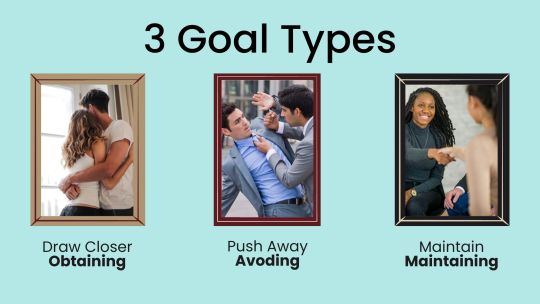
2. Choose a Tentative Theme Early, to Better Shape and Evaluate Your Story
If you've been following me for a while, you probably know I consider these three things to be the triarchy (formerly known as "trinity") of storytelling: character, plot, and theme.
Each of these elements comes out of and influences the others.
This also means you can use each of these to help shape and evaluate the quality of the others.
It's much easier to write a solid story when you understand all three.
If you have only one or two pieces, it's harder to discern which ideas are just okay and which ideas are great. It's harder to discern what does or does not belong in your story.
The best ideas for your story are going to come from and touch each of those three things.
Most beginners are familiar with concepts of characters and plot.
Few know anything about theme.
And fewer still have the desire to learn anything about theme. It's often seen as unimportant or something that "just happens." Okay, sure, it could just happen. Maybe.
But writing your story will (in the long run) be much easier if you at least understand some basics about theme.
I have so much to say on theme, it could probably fill up a book (and maybe someday it will), but for now, if you want more information on it . . . I'd recommend starting with this article: The Secret Ingredients for Writing Theme. It breaks down the key elements of theme, which can give you a good foundation.
Even if your theme ends up changing a bit, starting with an idea in mind will help keep your story on track.
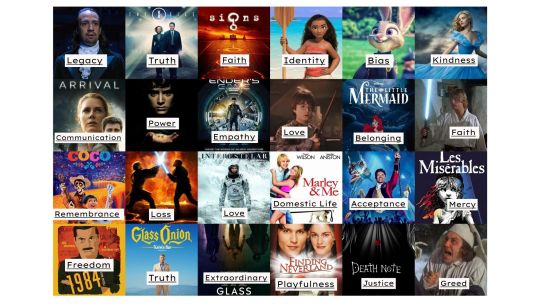
3. Your Story Needs a Counterargument
Remember when I was talking about theme, and implied I wasn't going to go into it that much more? Well . . . I guess I'm going to go into it a little more.
The thematic statement is the argument the story is making about life.
But it's not really an argument if no one is disagreeing.
This means your story needs a counterargument (I call this the "anti-theme").
This counterargument will often manifest within the protagonist (as a "flaw" or misbelief or something the character needs to cast off or overcome) and/or within the main antagonistic force.
It can technically show up in other places and in other ways, but let's keep this basic.
So if your story ultimately shows the audience that it's best to be merciful, then a counterargument for that could be that it's best to enforce justice (Les Mis).
If your story ultimately shows the audience that it's best to ask for, give, and receive help, then a counterargument for that could be that it's best to avoid, withhold, and refuse help and do everything yourself (A Man Called Otto).
If your story ultimately shows the audience that it's best to rely on faith, then a counterargument for that could be that it's best to rely on technology (Star Wars IV: A New Hope).
The two arguments are locked in a "battle" of sorts, similar to how the protagonist and antagonist are, because they are in opposition to one another (see #5 in previous article).
The arguments need to be "shown" more than "told." And the counterargument should be given fair weight, because doing so will actually make the whole theme (and plot and characters) stronger.
Here are some examples to think about:


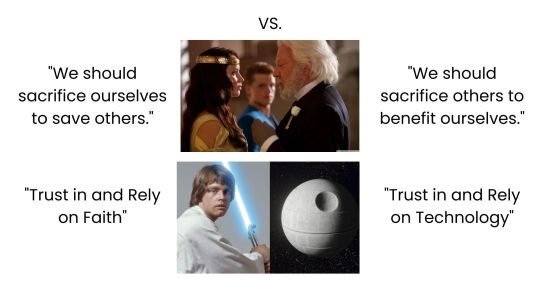
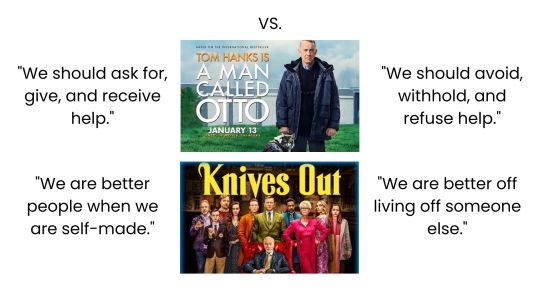
4. Writing More isn't Enough to Take Your Work to a Professional Level
We are often told that if we want to be great writers, we need to write more. And this is true. To an extent.
I've worked with writers who had been writing for decades, but were still at a beginner level.
I have known writers who bent over backward to meet word count goals, only to end up with a pile of slush they couldn't see their way out of.
I myself have spent enormous amounts of time and words trying to write something brilliant.
But for the vast majority of people, putting in the time and word count isn't enough.
What is the point of clocking in more and more hours and typing more and more words if you don't know how professional-level stories actually work?
Don't get me wrong--you absolutely need to put in time and words, and they absolutely will help you improve! And yes, quantity can improve quality.
But also remember this: You don't know what you don't know.
And if you are practicing imperfectly, that doesn't guarantee that one day it's going to be perfect.
If I have lousy technique every time I go bowling (and frankly, I do), that doesn't guarantee I'm going to get any better if I don't know what I'm doing wrong or how to improve or what good technique looks like--no matter how much time I put in.
This is sadly usually true for writing.
I'm not saying that no one gets to the professional level by only clocking in writing hours, but just that . . . I don't think most of us do. And I think some of us could spend decades clocking in the hours, and really, just be spinning our hamster wheels because we don't know what we don't know--we don't know why professional stories are professional level, so we don't know how to improve.
Hands-on practice is vital.
But so is education.
Sometimes it's actually more beneficial to learn about the craft from someone than to complete your Xth writing sprint to meet your word count goal.
If I could speak to my past self, I would tell beginner me to spend more time studying the craft. In the long run, it would have actually helped me get better easier and much faster than clocking in another hour of writing (that would have ended up in the garbage bin anyway). I've put in a lot of hours that didn't get me very far because I didn't fully understand where I was trying to get, or how.
There is always more you can learn. And especially in the writing world, there is always another perspective to learn what you think you already know. Many writers talk about the same subjects, but come at them from different angles, and learning even those different angles can help you refine your understanding of that subject.
I'm not going to say that tomorrow you have to sign up to take a bunch of courses (though you can if you want), but make time to learn about the craft regularly. You may want to ask yourself: Is it better for me right now to write for an hour or to learn for an hour?

5. Conflict for the Sake of Conflict is Actually Filler--You Need Consequences!
There is an adage in the writing community, which is that story = conflict.
And once again, it's true. To an extent.
But adding a bunch of conflict isn't enough to make a story good.
If the conflict doesn't change anything--if it doesn't have at least the power to change any outcomes, then what is the point? It's just stuff happening.
Who cares if a bomb is going to go off, if no one or nothing significant is in danger of being blown up?
Conflicts need consequences to be meaningful.
It's really the consequences that hook and draw readers into the story. Or at least, the potential consequences. It's potential consequences that make up the stakes in the story.
And they draw the audience in because the audience wants to see if what could happen actually does happen.
Once the audience understands the potential consequences (the stakes), they care about the conflict, because how the conflict is resolved will affect what happens next. The conflict now has significance because it changes the direction of the story, it changes the future.
Consequences also improve the story by strengthening a sense of cause and effect.
As I touched on in my previous post (see #4), random bad things happening is actually less effective (and makes characters less sympathetic). And random good things happening is also less effective (and makes characters less admirable). Instead, it's better if the bad and good things that happen come as a consequence to how a conflict was resolved.
This often happens even at a scene level. Just as nearly every scene should have a goal and antagonist, nearly every scene should have conflict. How that conflict is resolved in that scene should also carry consequences and affect what's going to be happening in the near future of the story (generally speaking).
Consequences also allow the audience to experience tension, which, as counterintuitive as it sounds, can be more effective than outright conflict. Tension is the potential for problems to happen. Conflict is actual problems happening. Tension makes the audience feel suspense. But suspense often only exists because the audience understands the potential consequences (the stakes) in play.
If there are no known consequences, then the conflict often doesn't really matter to the audience, because they can't see how it will change anything significantly.
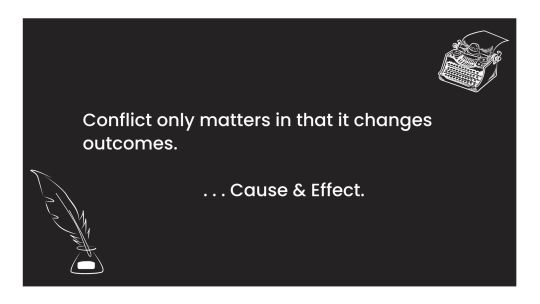
6. Starting in Medias Res is Actually Harder, not Easier
A lot of beginning writers struggle with beginnings--which makes sense, because they can be very difficult to write.
And so a lot of beginning writers are told to open their stories in medias res, which translates to "in the midst of things." This basically means you open the story up with some form of rising action (conflict)--usually it's that scene's rising action (see #2 in my previous post).
In other words, you are essentially cutting off the scene's setup.
While this can be effective, and while I may be unpopular in my opinion, I don't feel that it makes things easier. In fact, more often than not, I think it's actually harder to start in medias res.
This relates to what we just talked about above in #5.
When we start a scene in medias res, we are starting with conflict, but if the audience doesn't know why the conflict matters, then it won't hold them for very long.
When you cut off the setup of a scene, you now have to find a way to convey who is there, where is "there," what is there, when, and why we care (the why is the stakes).
--all without slowing the pacing.
This is why I think it's often (though not always) more difficult.
Now don't misunderstand me. I'm not saying you can't start in medias res, or that you shouldn't start in medias res.
I'm just saying it's tricky.
Instead, I would personally recommend starting just before the scene's conflict. Start early enough to give the audience context to understand what is about to go down: where and when the scene takes place, who is there, what the goal is, and what the potential consequences are. Make the setup long enough to convey the important stuff, but short enough to stay interesting.
Then get to the scene's conflict, the rising action.
You can read more than you probably want to know about in medias res here.

7. Yes, You Really Need to Do That If You Want to Write at a Professional Level
This last thing is pretty nonspecific, as it's not about one particular piece of writing advice. When I started taking writing seriously and going to conferences and listening to podcasts and what have you, I often felt skeptical of what I heard. Now, sometimes that skepticism served me well (and has led to many of my blog posts), but other times that skepticism held me back. What's the difference?
Being skeptical of "writing rules" has, in the long (long) run, served me well, because it has actually led me to better understand the rules, why they are rules, how they work, and how and when to break them.
But sometimes it wasn't that I was skeptical of the rule itself. It was that I was skeptical that I needed to do X at all. I was skeptical that professionals actually did X.
For example, I would hear about Swain's scene structureand think, Yeah, there is no way most people actually do all this and put all this thought into their scenes.
Or I would run into a breakdown of character arcs and think, Yeah, there is no way most people actually do all these things to write a great character arc.
And in the community, I have brushed up against this same mentality from others. Viewpoint is a popular subject. "Do I really need to be in one character's viewpoint at a time?" or "Is it really that big of a deal that I described the viewpoint character's face?"
And I'm like . . . on the one hand, no, and on the other hand, well yes--if you want to write at a professional level and be competing professionally.
Not that no professional ever varies from that, but just that those are exceptions that prove the point.
And it's not even that every professional is consciously doing X thing. They may be doing it subconsciously. But X thing usually still needs to be there, for the story to sound professional.
So yes, you really do need to do X thing if you want to be writing at a professional level.
If you don't care about writing at a professional level, then obviously you don't have to. It's totally valid to write for a hobby or just for fun.

Now I will echo what I said last time. If I had waited until I understood all these things to start writing, I would have been waiting forever. And some things I would have never properly understood without the actual writing process. Yes, we need to be educated on how stories work, but it's also important to sit down and write.
#writing tips#writing tips and tricks#writing help#writeblr#writing advice#writer#writing reference#writing tip#writing
744 notes
·
View notes
Text
Questions to ask your alpha/beta readers
I thought I would put together a master list of all the questions to ask your alpha and beta reader to help you improve your story.
You can choose to ask questions every chapter, every few chapters or after the whole book. This list of questions will be more generic and all encompassing for you to tailor to your needs.
Reminder: Beta readers typically receive a completed and polished version of your story. They give feedback on any last improvements based on the reader’s perspective. Alpha readers read your story or manuscript before it’s completed, usually a rough draft. Alpha readers are best if they also have some writing experience to give reader and writer feedback.
Choose some of the following questions to ask your readers:
Start:
When did you first feel the story was truly starting?
Do you like how the story started? If not, why?
Do you find characters were introduced slow enough to learn them all?
Did you find settings, different languages, and cultural differences were introduced slowly enough to not be confusing or overwhelming?
Were there any moments you found yourself going back over old exposition just to understand what was happening?
When, if at all, did you find yourself being pulled into the book?
Did the first sentence grab your attention?
Did the first few pages draw you into the story?
Did you find the opening paragraph/page interesting enough to continue reading?
Characters:
What do you like about the MC? What don’t you like? Can you name at least one relatable trait between yourself and the MC?
How did you feel about the character(s)’s growth from the start to finish of the story? Did you find there was enough? Was it believable?
Are the MC’s motivations and goals clear and strong enough?
Did you feel the MC’s fears, hopes, excitement, passions, etc.?
Did you get confused between the characters?
Were the characters believable?
Are there any characters you wish were more interesting? Why and how?
Do you feel each supporting character had their own motivations and contributed to the plot?
Are there any characters that seem cliché, underdeveloped, or stereotypical? If so, why?
Were the character relationships believable?
Did the romantic relationships build naturally, or did it feel forced?
Are there any character names that were too difficult to read or sounded too similar to others?
Were there any parts where the characters seemed to be acting out of character?
Who was your favorite character?
Which character, if any, did you wish was more present?
Which character do you care for the least?
What are your thoughts/feelings on the MC’s character arc?
Do you feel like the antagonists and/or villain is just as fleshed out and relatable as the MC?
If you had to remove one character, who would it be, and why?
Which character would you like to meet, and why?
Did you hope or dread any character relationships?
Are there any characters you found annoying and frustrating?
What are your general thoughts and feelings about the MC or supporting characters?
Which character did you find least developed?
Plot:
Which moments in the book did you find the most suspenseful?
Were there any moments in the book you found boring, lagging, or uneventful and unnecessary?
Did you find the pacing to suit the story well? Are there any areas you found moved too fast or too slow?
Was there ever a time you felt like you weren’t excited or intrigued enough to want to continue?
Did you find any plot holes? Any discrepancies in timeline, characters, descriptions, or other details?
Were there any scenes you found did not further the plot at all?
Are there any scenes or events you found to be too long or too short?
Did you find all explanations and revelations came out naturally and at appropriate times?
What was your favourite scene in the book? Why?
What was your least favourite scene in the book? Why?
Are there any chapters you found lacked conflict?
Did the action scenes make sense as you read them? Did you understand how they came to that action scene (or did they feel random)?
Where there any moments or scenes that made you feel emotional? Happy, sad, cringy and disgusted, etc.
Do you find the plot moved logically and naturally between scenes and chapters?
Are there any moments you felt detached or pulled out of the story? When and why?
Are there any events or scenes you found confusing? Either what was happening or how the characters came to that point?
Where you surprised by the plot twist?
Settings:
Which setting in the book was the clearest for you to visualize? Which do you remember the best?
Did you find the setting interesting, with vivid and real description?
Were there any scenes you thought lacked description?
Were there any moments you thought there was too much exposition, or not enough?
Did you find there were moments you didn’t know where the characters were unless stated?
Do you find the culture and historical events are realistic and add depth to the story?
Is there any exposition you found unnecessary? Are there any moments you wish you had more exposition?
Did all technology and science, or magic, make sense or seem believable?
Was there ever too much or too little description?
Dialogue:
Did you find that each character had their own personal voice when speaking?
Are there times where you couldn’t figure out who was talking solely based on how they spoke?
Is there any dialogue that sounded unnatural?
Could you see what the characters were doing and where they were while talking?
Was there any dialogue that seemed to not fit well with the story?
Was there any dialogue that you thought had too much exposition or explanation?
Did you find the dialogue kept your interest?
Ending:
Did you find the ending to be satisfying and emotionally fulfilling?
Are there any questions you had left after the story ended? (Mostly for stand-alone)
What did you hate most about the ending?
Did you find the ending believable?
Did you feel the tension building to the climax?
Was the climax worth the read, or did it feel weak?
Do you feel the ending came on naturally, or did it feel forced or rushed?
Did the book feel too short or too long?
General:
Were there parts where you found yourself skimming?
Which parts of the story did you find it easy to put the book down?
At what moment did you decide you wanted to finish the book? (If not DNF)
What are some of your favourite lines/quotes from the book?
Do you have any predictions for what you think will come next? (Good for chapters or end of book)
Is there something you hope will happen?
Is there anything you hoped would happen and was sad when it didn’t?
Did you find the map and glossary helpful? Is there anything you think would be beneficial to add, such as terms or names?
Are there any moments or scenes you found ethically and socially problematic and unacceptable.
Were there any moments in the story that made you stop and think?
Were you able to identify the story themes? Did you find the themes well developed throughout the story?
Did you think about the story when you weren’t reading it? If so, what were your thoughts?
Were there times during the story where you felt description was told instead of shown?
Does this book make you feel the same as other books in the genre when reading?
Is there anything you really enjoy from this genre that you found lacking in this story?
Did you find the story kept your attention with enough action, conflict, intrigue, and tension?
Do you find the story or writing style like other books you have read?
Are there any moments you found confusing, irritating, annoying or frustrating?
Are there any moments in the story you thought, “this could/would never happen”?
Did you have any questions after reading the book?
What are your general thoughts and feelings about the story?
Is there anything you wish there was more or less of?
What do you think were the best/ strongest aspects of this book?
What do you think were the worst/ weakest aspects of this books?
How would you describe this book to a friend?
Would you recommend this story to someone?
How likely/ eager are you to read the next book in the series?
Chapter specific
On a scale from 1-5, how much did you enjoy this chapter?
On a scale from 1-5, how eager are you to read the next chapter?
What predictions do you have for the next chapter?
What do you hope will happen next?
Please keeping in mind: Don't let another writer tell you what to change or how they would write it. You are the writer, and any changes are your decision. This feedback is only to give you an idea on which areas to improve.
*Alpha and Beta readers should be readers in the same genre that you write. People who mostly read mystery will not be good a/b readers for a romance novelist, or any mismatch. If you write romance, find a/b readers who love to read romance. Otherwise, any advice they give may not be as valuable or useful as you hope.*
If you have other questions you think would be useful to ask your readers, message me or add them in the comments so our list is comprehensive.
Happy Writing!
#writing community#writing advice#beta reader#alpha reader#writing reference#long post#creative writing#tumblr writers#writing tips#writer#female writers#wip stuff#writblr#fiction#writing process
1K notes
·
View notes